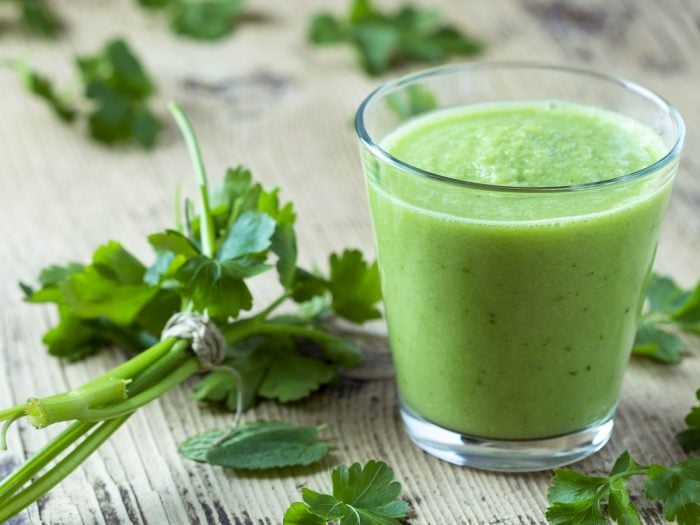The green juice revolution has been glamourized by several celebrations over the past few years, including detox-proponent Gwyneth Paltrow, Demi Moore, Madonna, Jennifer Lopez, Blake Lively, and many others. They swear by the fact that this miracle juice can help make you radiant, help you digest food faster, and flush out the toxins from the body. Cheerleaders of the green juice campaign also say that the juice helps return the body to a more alkaline state and in turn, helping the body reverse the aging process. However, there is also an underlying message that seems to come with the green juice – that it could help you lose weight. So, does green juice help you shed the pounds? Let’s find out what research studies say about green juices and weight loss.
Does Green Juice Help In Weight Loss?
Green juice may help you lose weight in the short term. But the ingredients in the juice makes a difference. Green juice is usually made with raw green leafy vegetables or herbs such as kale, collard greens, chard, spinach, parsley, or celery stalks. A simple juice is made in a juicer or a blender with water and sometimes, seasoned with salt, ginger, and/or lemon juice. You also get packaged green juice powder for convenience so that you don’t have to cut, clean, and prep the vegetables for the juice.

Can green juice help you lose weight? Photo Credit: Shutterstock
According to a 2017 study by researchers from the University of California, a 3-day juice intervention helped people lose weight of an average of 1.5 kg and this effect remained stable for two weeks. The Body Mass Index (BMI) of the individuals also decreased and stayed stable for the same span of time. The study was conducted with a small sample size of 25 healthy people who consumed 6 bottles of juice daily as part of the juice cleansing program. The juices included mixtures of greens, roots, citrus, lemon, cayenne, and vanilla almond. The green juice was a blend of apple, cucumber, celery, romaine lettuce, lemon, and a limited amount (<2%) of spinach, kale, and parsley. The study also concluded that weight loss mainly occurred due to a change in the type of gut bacteria due to the consumption of raw juices. However, the sample study is small, and larger clinical trials are required to better understand the impact of green juices on weight loss. [1]
Green Juices Vs Green Smoothies
Green smoothies, unlike green juices, have additional ingredients added to them like mango, coconut water, green apples, bananas, berries, and yogurt to give them a thicker consistency. They are higher in calories than green juice and are usually had as part of a power breakfast. According to a post on the T. Colin Campbell Centre for Nutrition Studies, green smoothies contain a lot of sugar as compared to the nutrients in it. It may cause blood sugar spikes and could be harmful to people who are trying to lose weight, have diabetes, or have a high level of triglycerides. So while green juices may help you lose weight, green smoothies are not as good an option. [2]
FAQs On Green Juices
Is green juice really good for you?
Ideally, it is recommended by nutritionists to get your five servings of fruits and vegetables without having to juice it as a lot of nutritional goodness such as fiber is lost in juicing. The American Heart Association says that one serving of 100 percent fruit or vegetable juice can be considered as one of the daily recommended servings. However, make sure the juice is 100 percent juice (or juice and water) and watch out for calories, added sugars, or sodium. [3]
What is the best green juice & can I drink green juice every day?
Different green juices have different nutrition components – some can help you lower blood pressure and yet others, can help you cleanse the liver. It is best to have a green juice based on your doctor’s or nutritionist’s recommendation if you are planning to have it regularly. A registered dietician and nutritionist can also recommend the best green juice for weight loss. Regular green juice consumption can cause drug interactions if you are on medications. It can also set you up for prediabetes risk or cause blood sugar spikes. [4] [5]

